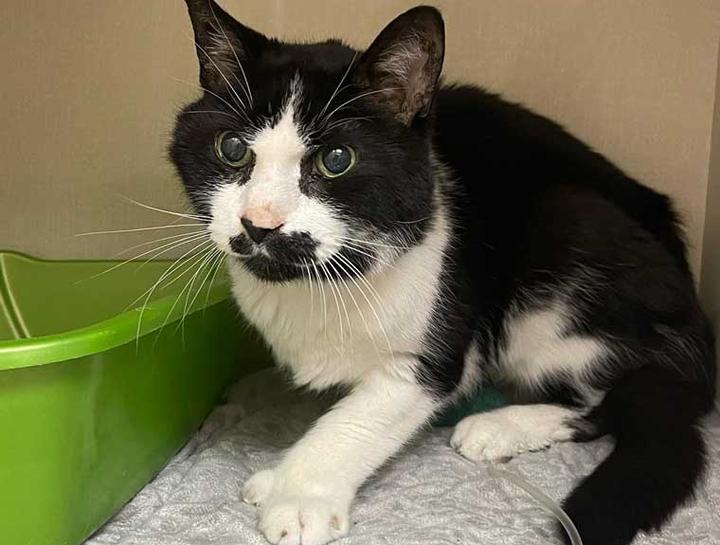Cat Emergencies
Find treatment fast.
We are accepting veterinary emergencies for all Downtown Toronto Cat Clinic clients and new clients if a veterinarian cannot fit you into their schedule. We can help you and your cat.
Please call 416-479-0142 if your pet is experiencing an emergency. Do not email for emergencies!
Our clinic opens at 9:00 am but you can leave a message on our phone at any time. We will have you drop off your cat at a specific time and triage the medical cases. We will let you know the treatment plan for your cat. We are here to help you during this stressful time.
In case of an after-hours emergency, please contact:
Veterinary Emergency Clinic
Entrance at the rear on McMurrich, 920 Yonge St Suite 117, Toronto, ON M4W 3C7, Canada
P: +1 416-920-2002
Toronto Animal Health Partners Emergency and Specialty Hospital
1 Scarsdale Rd, North York, ON M3B 2R2, Canada
P: +1 416-380-7400
How to Know When Your Cat is Sick
Behavior Change
If your cat’s temperament changes unexpectedly, they are probably telling you something.
Change in Appetite
Changes in appetite are a classic sign of feline illness, although some don’t simply stop eating. They may just become picky, or switch from preferring dry food to craving only canned.
Increased Thirst
If your cat is drinking more, he should urinate more. A soaked litter pan or urine accidents outside the litter box are reasons to call a vet.
Vomiting and Diarrhea
Repeated vomiting over a 24-hour period is not normal and can indicate a serious infection or intestinal blockage. Chronic, recurrent spit-ups are another concern, especially if accompanied by weight loss, lethargy, or diarrhea.
Straining to Urinate
Bladder problems are quite common in cats. Typical signs include frequent trips to the litter pan, labored or painful urination, or bloody or discolored urine.
Breathing Problems
The signs of respiratory disease can be subtle. Symptoms to watch for include cough, wheezing, shortness of breath, and shallow rapid breathing.
Bad Breath
All cats have fish breath; however, an unusually foul odor may indicate a painful ulcer or tooth abscess.
Dull Coat
If your feline friend is looking like something they dragged in, there could be a problem.
Neurological Signs
Weakness, stumbling, falling, head tilt, disorientation, loss of consciousness, and seizures: are all key neurological signs.
Lumps and Bumps
Lameness
Unexplained Weight Loss
Signs You Need to Take Your Cat to the Emergency Vet:
Stopped Eating
A cat who won’t eat often means serious trouble and can cause fatty liver and severe dehydration.
Stopped Drinking
If your car has had nothing to drink in the past 24 hours, despite available water, take the animal to the vet as this cat leads to severe dehydration.
Frequent Diarrhea
If diarrhea is liquid and/or blood in stool, frequent visits to the litter box, crying or struggling in the litter box, and confined for more than 24 hours should be taken to a veterinarian.
Profound Lethargy or Collapse
Profound lethargy often manifests as “not moving,” hiding in one room for a protracted period, and not reacting to stimuli (such as the can opener or the dog) in a normal fashion.
Breathing Trouble
If your cat is struggling to breathe in any way, head to the emergency vet. Open-mouth breathing, coughing, panting, and rapid and exaggerated breathing are signs of respiratory distress.
Frequent Vomiting
Vomiting itself is not an emergency condition in cats, but many vomiting episodes within a couple of hours can be. Vomiting has many different underlying causes and can result in dehydration if left untreated
Long-Lasting Abdominal Discomfort
Cats may develop abdominal pain for many reasons. If your cat shows signs such as arching his or her back constantly or breathing heavily even when the temperature is normal.
Your Male Cat Can't Urinate
Cats who try to urinate and can’t produce urine or cry in pain when they go to the litterbox as this can be a life-threatening emergency.
Seizure
Seizures are quite dangerous in cats and should be considered an emergency.
Poisoning
If you know your cat has eaten something toxic, take him to the emergency vet without waiting for signs of poisoning. If you are unsure if it is poisonous, you can contact a veterinarian or a poison control hotline.
Accident or Bleeding or Limping
If you you know your cat has suffered trauma of some kind, non weight-bearing, cries in pain, or excessively bleeding, this is an emergency.
Paralysis in One or More Limbs
If your cat suddenly shows signs of paralysis in one or more limbs and is crying this cause be a thromboembolism which is an emergency.
Crying When Touched
These symptoms are less dangerous but can still be a cause to visit your veterinarian.
Intermittent Vomiting
If your cat is vomiting more than once a month this is not normal and should be seen by your veterinarian.
Diarrhea
If your cat has only one episode of diarrhea you can wait and see if they improve.
Redness and Watering of Eyes
Frequent Sneezing
Sudden Changes in Behavior

